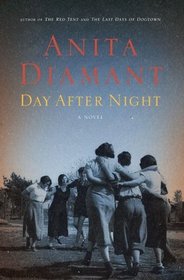Helpful Score: 4
I was disappointed in this book. I thought the premise was fascinating - Jews who were being detained after WWII by the British as they made their way to Israel. There was so much I didn't know about this period of time, and after reading this book I still don't! I think this book could have been much more in-depth, both in the history and in the characters. The characters were almost two-dimensional - I didn't feel connected to any of them - the backgrounds were only a few pages long and scattered around the book. Unlike The Red Tent, which was outstanding, this book just didn't do justice to the story.
Helpful Score: 2
A story of courage, strength and loving friendships. Ms. Diamant gives us the gift of these four women in an intimate picture of life in a haunting era of time.
Helpful Score: 2
I went into this book with high expectations, but it just didn't quite meet these expectations. At first, it was a bit hard keeping track of all the characters, but that got easier as you learned more about each of them. I enjoyed the basic storyline and some of it was painful to read but necessary. I was a bit disappointed to see the story go on and on and then suddenly/abruptly wrap up. I did like the final glimpse the author gave of the characters. Not sorry I read it, just was a little short of my hopes for it.
Helpful Score: 2
Very moving story. Characters were well developed. I recommend it highly.
Helpful Score: 1
As with her most widely known work, The Red Tent, Anita Diamant focuses on the women in her latest novel based on the Atlit detainee camp preventing persons without papers from freely entering British-ruled Palestine. Day After Night might refer to the detainee's experiences of surviving WWII in Europe, or the October 1945 escape from Atlit. However, it did not describe my experience reading this book after The Red Tent.
Whereas Dinah was a strong central character in The Red Tent, much of Day After Night describes mostly the listless days in the camp, slowly leading up to the escape which no one really knew about until the end. The narrative alternatively focuses on four women (Tedi, Zorah, Leonie, and Shayndel), slowly revealing how each survived the Holocaust in different ways. The women don't talk about their experiences with each other, and it was unclear until the end that they were particularly close. The action was slow-moving, almost like watching a black-and-white film of a flowing stream. Moreover, the somewhat anti-climatic escape leaves some loose ends about other characters whom Diamant spent time developing. Although it brought to light an aspect of the Holocaust not usually emphasized, as well as the British Mandate of Palestine and Israeli statehood, Day After Night did not show off Diamant's storytelling talent so evident in The Red Tent.
Whereas Dinah was a strong central character in The Red Tent, much of Day After Night describes mostly the listless days in the camp, slowly leading up to the escape which no one really knew about until the end. The narrative alternatively focuses on four women (Tedi, Zorah, Leonie, and Shayndel), slowly revealing how each survived the Holocaust in different ways. The women don't talk about their experiences with each other, and it was unclear until the end that they were particularly close. The action was slow-moving, almost like watching a black-and-white film of a flowing stream. Moreover, the somewhat anti-climatic escape leaves some loose ends about other characters whom Diamant spent time developing. Although it brought to light an aspect of the Holocaust not usually emphasized, as well as the British Mandate of Palestine and Israeli statehood, Day After Night did not show off Diamant's storytelling talent so evident in The Red Tent.




